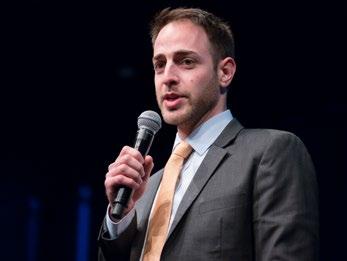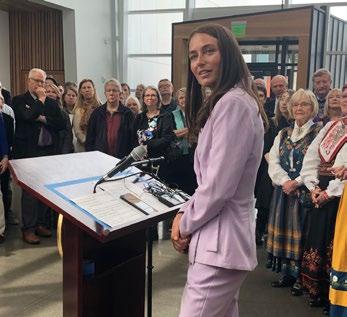
2 minute read
Mentoring the Next Generation of Arctic Leaders
A Profile on Course Mentor Rebecca Lynge and Arctic Innovation student Ross Eisenberg
by Erik Wilke
During the Policy and Social Innovation in the Arctic course at Harvard Kennedy School students were asked to develop an innovative solution to an emerging Arctic issue. Students honed their ideas through consultation with the course instructors and were paired with some of the expert course mentors who specialize in their issue area to coach them on how to develop their innovation to pitch at the Arctic Innovation Lab.
One mentor who helped coach our Innovators was Rebecca Lynge, First Secretary at Greenland Representation in Washington, D.C. Ms. Lynge, a native of Greenland, has seen the dramatic impacts of climate change in the Arctic and understands the importance of educating young people that challenges facing the Arctic are a bellwether for changes that affect everyone, “Educating students about the Arctic, giving them the tools to craft solutions for the sustainability of the region is what we need.’’ Lynge has served as a mentor to several students in the program, including Ross Eisenberg, whose studies at the Kennedy School focused on climate change resilience, housing, and development internationally. Eisenberg’s innovative idea, which he pitched at the Arctic Innovation Lab, focused on creating permafrost thaw insurance to address the risks to infrastructure that occur when permafrost melts. Eisenberg advocated for more research on ways to identify risk and prevent destruction, as well as government-backed permafrost insurance to reduce the economic risks of building on ice; a near-necessity for those in the far north.
Mr. Eisenberg’s permafrost insurance solution was featured in Arctic Today, an independent news source focused on the Arctic which helps to spread the voices of people around and the globe, including the op-eds from the Arctic Innovators, by publishing their work concerning the polar north.
Ross Eisenberg said of his experience in the course, “Working with Ms. Lynge as mentor really helped me learn more about what it takes to develop an innovative idea. What I learned in this course about leadership in the Arctic context will be very valuable to me in the future as I develop, test, refine, and pitch new ideas to diverse audiences.” The changes in the Arctic are magnifications of changes around the globe. The mentorship by officials like First Secretary Lynge of students here at Harvard promises to better prepare young leaders to be aware of the challenges climate change poses and to develop them to take ongoing action. For the future students and leaders involved in the Arctic issues, Lynge says, “Everything helps. The Arctic Initiative having focused attention on the issues in the Arctic and how they affect us globally is really great. It’s important work.”

First Secretary Lynge urges those interested in finding out more to check out Climate Greenland at climategreenland.gl. Climate Greenland is a source of information and news run by the Ministry of Nature, Environment and Research in Greenland.
Read more about the Arctic Innovation course at hks.harvard.edu/courses/ policy-and-social-innovations-changing-arctic.










